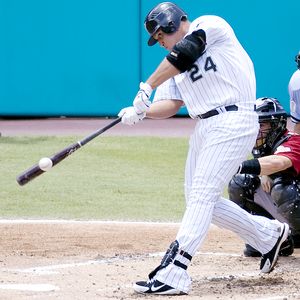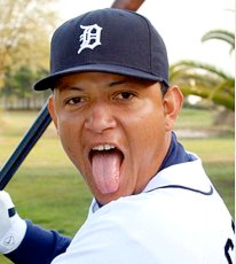José Miguel Cabrera Torres (born April 18, 1983, in Maracay, Aragua State, Venezuela) is a Major League Baseball first baseman for the Detroit Tigers. He bats and throws right-handed.
He is a five-time All-Star, having been selected to the National League All-Star Team in 2004, 2005, 2006, 2007, and the American League All-Star Team in 2010. Cabrera has started at least 100 games at first base, third base, left field and right field. He progressed through the Florida Marlins minor-league system, and was called up from the Double-A Carolina Mudcats in June 2003, and went on to help the Florida Marlins win the World Series that year. According to Baseball-Reference, Cabrera was putting up statistics comparable to Hank Aaron and Ken Griffey, Jr. at age 26, and is considered one of the best hitters in baseball today. He is a very intimidating hitter, as he consistently hits the best pitchers in baseball. Dan Haren quoted saying, "You're going to make good pitches, and he's going to hit them."
Early life
Cabrera was born on April 18, 1983 in Maracay, Venezuela to parents Miguel and Gregoria. Baseball was a part of his life from the time he was first able to pick up a baseball bat, and his parents had actually met on a baseball diamond. His mother played 14 seasons as shortstop for the Venezuelan national softball team, and Cabrera isn't shy to admit his mother taught him his swing. His father is also an accomplished baseball player having his big league dreams cut short as an amateur player. His uncle, David Torres, signed with the St. Louis Cardinals and made it to Double-A ball in the organization before his career came to a halt.
Miguel grew up a baseball fanatic, and when he wasn't playing with his family honing his skills he was able to watch baseball games at the nearby city ballpark whose right field fence also served as the fence for his very own backyard. Basketball and volleyball also consumed his time, although baseball had always remained Miguel's primary focus. At the age of six he had already admitted to his grandmother that he wanted to play big league ball. After his father's dreams of playing in the major leagues had faltered, he didn't want the same heartbreak to affect his son, so he asked Miguel to focus on becoming an engineer.
By the age of 14, Cabrera had become an outstanding baseball player, and became confident enough in his abilities to tell his father he wanted to pursue a career in the major leagues. The elder Miguel Cabrera agreed to support his son as long as he continued to do well in school and obtain a high school diploma. At this point, MLB scouts were already hot on Miguel's trail, and he amazed them with his maturity and power.
The Florida Marlins had been his favorite team, and they eventually won the bidding war offering him $1.8 million to sign with their organization. He had to wait until his 16th birthday to sign, and in the meantime he continued working on his skills and furthering his education. Following his signing with the Marlins Organization in July 1999, it was rumored that Yankees' general manager George Steinbrenner was so furious that he fired three of his Venezuelan scouts.
Minor leagues
Miguel began to rise through the Marlins' farm system teaming with future major leaguers Adrian Gonzalez and Dontrelle Willis. He began his professional career as a six-foot-two-inch 185 pound shortstop in the Gulf Coast League. Although he had below average speed, he had a rocket arm, above average plate discipline, and a thorough knowledge of the game. After batting .260 with 10 doubles, 2 triples and 2 home runs through 57 games, Cabrera was promoted to Class-A ball where he finished the final 8 games batting .250 with 6 RBIs.
Heading into 2001, the Marlins bumped Cabrera up to the Low Class-A Kane County Cougars where he teamed up with current Boston Red Sox first baseman Adrian Gonzalez. He got off to a rocky start to begin the season, but was able to improve his average to .279 by mid-season, and earned his way into the Futures Game during All-Star Weekend in Seattle, along with Gonzalez. Fighting a sore lower back, Cabrera went hitless in the showing. He ended the year batting .268 with 30 extra-base hits, 66 RBIs, and distinguished himself as having the strongest arm in the Midwest League.
Entering the following season, Cabrera was once again promoted; this time to the Jupiter Hammerheads of the High Class-A Florida State League. At the request of then Marlins assistant manager, Ozzie Guillen, Cabrera made the transition from shortstop to third base. Willing to do whatever it took to reach the major leagues, Cabrera displayed no resistance to the move. While it took some time to make himself comfortable at his new position, he showed no slowing in the batter's box. By July, his average was locked in at .277, and he led his team with 45 RBIs earning himself a second trip to the Future's game; this time picking up two singles. He didn't lose his stride as he finished the season batting .274 with 43 doubles and 75 RBIs. Up to this point, his power had yet to reveal itself as he hit just 9 homers in his 489 at-bats.
To begin the 2003 season, Cabrera earned another promotion to the Double-A Carolina Mudcats. There he teamed up with Dontrelle Willis, the left-handed fireballer with whom he would later join in the majors. In his fourth professional season, Miguel was shredding up the competition. In April, he hit .402, and by June his average stood at .365 with 10 homers and 59 RBIs before being called up to the majors.








No comments:
Post a Comment